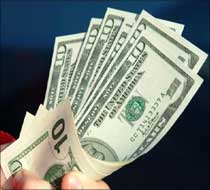 Swiss bank UBS has been fined $1.5 billion by British, Swiss and U.S. regulators to settle charges of manipulating global benchmark interest rates.
Swiss bank UBS has been fined $1.5 billion by British, Swiss and U.S. regulators to settle charges of manipulating global benchmark interest rates.
UBS said on Wednesday it will pay $1.2 billion to the U.S. Department of Justice and the Commodity Futures Trading Commission, 160 million pounds ($260 million) to Britain's Financial Services Authority (FSA) and 59 million Swiss francs ($65 million) to Swiss regulator Finma.
A panel of banks submit daily estimates of the interest rates at which they think they could borrow money on the open market.
The FSA said UBS had routinely sought to manipulate submissions to calculate benchmark rates, known as the London Interbank Offered Rate and the Euro Interbank Offered Rate and (Euribor), to make its trading positions more profitable and give the appearance the bank was on a stronger financial footing as the financial crisis began unfolding in 2007.
Below are highlights explaining UBS's misconduct, from the FSA's final notice.
- UBS's breaches occurred between January 1, 2005 and December 31, 2010, in Britain, Japan, Switzerland, the United States and elsewhere
- Individuals at the bank routinely took the positions of interest rate traders into account when making submissions involved in the setting of Libor benchmark rates in Japanese yen, UK pound sterling, Swiss francs, dollars and euros. Individuals at the bank also made internal requests to influence Euribor rates.
- About 40 individuals at UBS made improper requests to influence the rates directly, 11 of whom were managers.
At least five senior managers were also aware of the practice.
- UBS traders sought to influence the submissions of other banks participating in the setting of Japanese yen Libor.
Four UBS traders did so by colluding with interdealer brokers, and one UBS trader in particular also colluded directly with individuals at banks on the rates panel.
- In relation to Japanese yen submissions, UBS made corrupt payments of 15,000 pounds per quarter to brokers for at least 18 months to reward them for their help.
- UBS traders also entered into so-called "wash trades" to facilitate corrupt payments to at least three brokers, in relation to the setting of Japanese yen Libor. These were risk-free trades that had no legitimate commercial rationale and cancelled each other out.
- One UBS trader orchestrated a series of campaigns to manipulate Japanese Yen Libor at certain key points in 2007 and 2009, to benefit his positions.
The trader also asked brokers to manipulate their screens, to disseminate false information about prevailing market cash rates, and to make false bids and offers on cash trades in the market to skew perceptions of the rates at which cash could be borrowed or lent in the interbank market.
- UBS made at least 1,900 documented internal, external and broker requests in connection with Japanese yen Libor. Many of these were made in emails or electronic chat forums.
- After August 2007, as the financial crisis intensified and media scrutiny over banks' health grew, UBS issued "informal directives" to its Libor submitters to "protect our franchise in these sensitive markets", meaning to give an appearance the bank could borrow money easily. These were disseminated by UBS's group treasury and its asset and liability management group.
- UBS had no controls or policies governing the procedure for making Libor submissions from January 2005 to early August 2008. The bank conducted two reviews of these procedures, in 2008 and 2009. After the second one it took steps to address a conflict of interest that arose from having traders involved in the process.
($1 = 0.6155 pound = 0.9133 Swiss franc)
(Editing by Erica Billingham)












 © 2025
© 2025